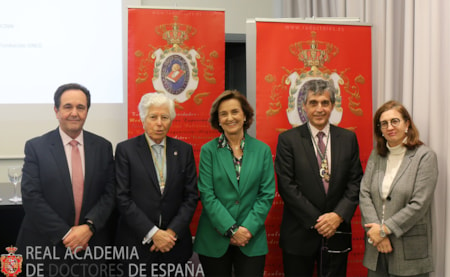
With the aim of promoting university
environments that are welcoming and cognitively accessible for people with
intellectual disabilities, Pablo Campos
Calvo-Sotelo, professor of Architectural Composition, held a session titled
'Inclusive Campuses - Architecture,
Disability, and Sensitivity.' This meeting was organised by the Section of Architecture and Fine Arts of
the Royal Academy of Doctors of Spain (RADE), facilitating an exchange of
experiences to raise awareness about disability.
Professor Campos, a full member of
RADE, was joined by Pedro Luis Nieto,
professor of Psychology at Universidad CEU San Pablo, Soledad Herreros de Tejada, president of the Prodis Foundation, and Isabel Martínez Lozano, director of
University Programs and Promotion of Young Talent at the ONCE Foundation.
The backbone of the session was
the R&D+i Project 'Inclusive Campuses and Architecture. Criteria to promote
welcoming university environments and generate cognitive accessibility for
people with intellectual disabilities' (Ministry of Science, Innovation and
Universities - PID2020-114373RB-I00-Principal Investigator: Pablo Campos),
which aims to:
1. Generate optimised criteria for
urban-planning architectural design on university campuses, transforming them
into more sensitive living environments for the community.
2. Promote social inclusion in the
university environment for people with intellectual disabilities (ID), who
participated in the production of these criteria.
The methodology employed was quite
innovative. After developing surveys specifically adapted for people with ID,
their emotional responses to various spatial typologies (3 scales: campus,
building, and classroom) were collected. The reason for involving them is their
extraordinary perceptual sensitivity to the physical environment. The results
provide an alternative perspective, which will be used to help boost creativity
when designing spaces in the future.
The event concluded with the
testimony of one of the volunteers with ID who participated in the research.
The event fulfilled its intended purposes:
1. Present the progress of the
'Inclusive Campuses and Architecture' Project.
2. Exchange experiences with organisations
dedicated to caring for disabilities (ONCE Foundation and Prodis Foundation).
3. Raise awareness about the need
to reinforce attention to vulnerable groups, supported by the scientific
endorsement inherent in every R&D+i Project.